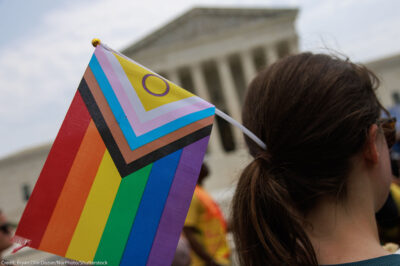The "" protest coming December 10 sounds like a good idea for gays in California who had their fundamental right to marry eliminated by a simple majority vote. When all the gay doctors, waiters, police officers, hairstylists and firefighters call in "gay" and don't show up for work, maybe voters of Proposition 8 will regret having stripped rights away from a group of people they may depend on, but take for granted.
Beyond California, there are 47 other states where the government views gay and lesbian couples as strangers. A "Day Without A Gay" will be a nationwide protest. As for Connecticut and Massachusetts, the only states that afford full equality to gay citizens, the day seems like a nice reminder to not pull a California and write gays out of their constitutions.
As a gay man, I'm angry. But as good as a day without gays might make me feel about my anger, is it really a good idea? Would this kind of demonstration get gay and lesbian couples any closer to the equality we deserve?
Maybe on a given day would send a powerful message if enough gays and our allies participated. But what makes me uneasy is that by giving the country a day of no gays, we make ourselves invisible on that day. Isn't invisibility and the closet what perpetuated our oppression in the first place?
It was 30 years ago this month that the first openly gay candidate to win elected office in the United States was assassinated. Harvey Milk, a supervisor for the City and County of San Francisco, famously said in the wake of multiple death threats: "If a bullet should enter my brain, let that bullet destroy every closet door."
He knew then what is just as relevant today. Society will not accept or afford gay people full equality until enough of society personally knows, likes and respects someone who is gay. The majority will continue to view gay relationships as less-than or icky until they actually know gay couples that live as busy and mundane lives as their own.
Many of my friends are eager to participate in the "Day Without A Gay" protest. Organizers are urging people to use the time off work to volunteer - December 10, after all, is International Human Rights Day. Volunteering certainly is a good way to spend a day.
So what happens after December 10? Imagine if the next day we all started a conversation with the family, co-workers and neighbors who might know or suspect we are gay, but who never ask about our relationships. Maybe they are afraid to ask, unsure what to say or how to react. Maybe we feel the same way, which is why we haven't brought it up.
The result might be some awkward and uncomfortable holiday dinners this season, but these are necessary conversations to let people know we are not invisible, that we are productive and integral members of society and that our relationships and families deserve all the same legal rights and protections everyone else enjoys.
Beyond December 10, imagine if we initiated a conversation every day. These conversations could happen in every type of workplace, neighborhood and family. In every race, class, culture and religion. Because gay and lesbian relationships are everywhere -- even if some wish to hide or deny that fact.
That Harvey Milk took an assassin's bullet can be sobering. Gay-bashing of the worst kind still happens. And it is still legal in for gay workers to be fired solely for being gay. But when the majority gets to know gay people and their families, they won't stand for such injustice. Gay will no longer be theoretical, the other or us versus them. It will be personal. Voters offered the choice to discriminate against gays at the ballot box will be forced to vote for or against someone they know on a first-name basis.
Conversations will get us there. Protests that antagonize or make us invisible may not.
The bullet that felled Milk did not destroy the closet as he wished. But a new movie about Milk with Oscar buzz will hopefully inspire a new generation to embrace his mantra. While alive, Milk spent much of his frenetic energy blasting one solid note everywhere he spoke: ""
It was devastating to lose Harvey Milk in November 1978 and the right to marry in November 2008. But the hope is how far we've come in between -- just having the right to marry, however briefly, was unthinkable in Milk's time. The hope is how energized gays and our allies have become in demanding equal treatment since the loss on Election Day. And the hope lies in how we reach out to that simple majority who voted against fairness and equality. Perhaps more than a "Day Without A Gay," what we really need is an ongoing "Days of Gays." That's when we can be present and visible, having the conversations with the people who need to understand why we are no less deserving than them.



